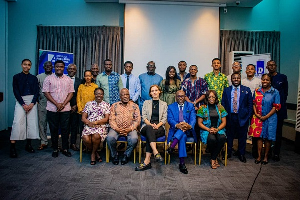 Participants at the event in a group photograph
Participants at the event in a group photograph
A high-level policy roundtable organised by the Konrad Adenauer Stiftung (KAS) in partnership with the Centre for Democratic Development (CDD-Ghana) has raised grave concerns over the politicisation of security appointments and dismissals, describing the practice as a threat to democratic stability and national security.
Held at the Royal Fiesta Hotel in Accra on May 5, 2025, the event brought together security experts, political analysts, academics, and civil society stakeholders to deliberate on the theme: “Balance of Power: Reforming Security Sector Appointments and Operations for Accountability and Democratic Governance in Ghana.”
In her keynote address, KAS Country Director Anna-Lena Sabroso Wasserfall emphasised the organisation’s commitment to supporting democratic governance through institutional reforms.
“Security institutions, when depoliticised and professionally autonomous, become more effective protectors of national stability—not instruments of partisan interest,” she stated.
She called for reforms to ensure that the appointment of top security officials is shielded from political manipulation, especially during election cycles.
Vice President of IMANI Africa, Kofi Bentil, cited landmark constitutional cases—including Azu Crabbe v. Republic and Theophilus Donkor v. Republic—to highlight the legal misconceptions surrounding the dismissal of high-ranking public servants.
He argued that changes in government do not constitute a legal basis for arbitrary removals under Articles 191, 202, and 296 of the 1992 Constitution.
“There is no express constitutional provision that empowers the President to remove the IGP or CDS solely on grounds of a change in government,” Bentil asserted, calling for clearer constitutional interpretations and reforms.
Dean of UPSA Law School, Professor Kofi Abotsi, critiqued the “winner-takes-all” culture embedded in Ghana’s political transition system.
He said the 2012 Presidential Transition Act inadvertently entrenched partisan control over state institutions.
“Public service should be focused on the state, not the government,” he emphasised, condemning what he termed the “securitisation of politics,” a process where national security tools are used for partisan ends.
Prof Abotsi described Ghana’s current constitutional arrangement as “a good constitution in bad hands,” criticising political actors for only calling for reforms when in opposition.
“The framers of the Constitution intended better than what we are doing with it,” he added, recommending constitutional review as a path toward institutional integrity.
Retired military officer and security expert, Colonel Festus Aboagye, revealed troubling developments in national surveillance.
He cited an instance where a costly Israeli security apparatus was acquired by the National Bureau, allegedly enabling unauthorised surveillance of citizens under the guise of national security.
He warned that such practices erode public trust and violate civil liberties.
In a comparative analysis, Major General EK Akotia examined security sector appointment procedures in countries like the UK, US, Kenya, and South Africa. He recommended that Ghana adopt a system in which appointments of Chiefs of Defence Staff (CDS) and the Inspector General of Police (IGP) are initiated by technically constituted Armed Forces or Police Councils.
These nominations, he suggested, should then undergo parliamentary vetting and final appointment by the President.
Major General Akotia also criticised Parliament and the Judiciary for their weak oversight roles in the security sector, noting, “Kenya’s model allows for institutional checks and balances that Ghana must consider emulating.”
The event concluded with a roundtable discussion, during which participants unanimously agreed that constitutional loopholes continue to create a widening gap between government, security services, and the state.
There were strong calls for a comprehensive constitutional review to restore trust, enhance accountability, and ensure the professional independence of Ghana’s security institutions.
